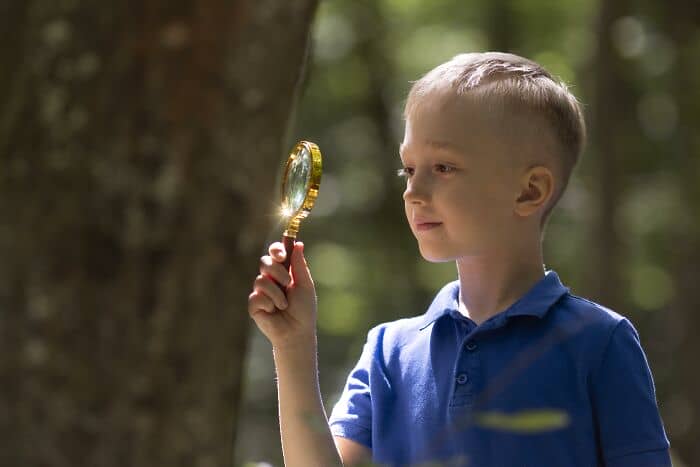From when we’re little, we’re told that it is important to be smart. And while our society seemingly values the typical academic knowledge the most, actually, there are many more ways someone can be intelligent, sometimes in a non-obvious way.
Yet, there are signs that give away their smarts. That’s what we’re going to focus on today — ways to tell someone is way smarter than they let on. All of the examples you’re going to see were suggested by folks under a viral Reddit thread, so it comes from human experience, not only our imagination.
More info: Reddit

#1

Rather than getting frustrated when they don’t know something, they get excited. I had a chemistry professor in college that was INSANELY smart, and when somebody asked a question she couldn’t answer, her eyes lit up as she said “I don’t know. Let’s find out!” To her, not knowing something was just an opportunity to learn something new.
#2

Dunning-Kruger demonstrates that the smarter you are, the more likely you are to express doubts about your own beliefs, your own knowledge, and your own intelligence; you are also more likely to overestimate the intelligence of other people.
They also show that the dumber you are, the more likely you are to show confidence in your own beliefs, knowledge, and intelligence; you are also more likely to underestimate the intelligence of other people.
In other words, the person saying: “You’re all stupid. I’m the smart one here,” is more likely to be less intelligent than the one saying, “We’re all intelligent people here. I might be wrong. What do you think?”
In general, over-confidence is valued more than intelligence. That suggests that, in general, people prefer dumbshits.
But, you know, I could be wrong. ;).
#3

Admitting they’re wrong. Reconsidering positions based on new evidence. Curiosity.
It’s no secret that it’s helpful to be smart in life. To acquire these smarts, we go to school from when we’re little until we’re grown and even then, some folks choose to continue their education. So, usually, when we’re told to imagine a smart person, we think of someone in academia – a professor, a researcher or anything similar, someone with a high IQ.
But what if we told you that academia or IQ levels are not the only ways to be smart? As We’s interviewee, professor Maurice Elias from Rutgers University, pointed out, American developmental psychologist Howard Earl Gardner suggested a theory of “multiple intelligences.”
#4

Good comedy. There are so many great comedians who play dumb and make jokes about how stupid they are, but I think you have to be quite above average intelligence in order to be a really great comedian. .
#5

They tend to be interested in many different topics. They are naturally curious about many different things.
#6

Very quick wit. You have to be smart to process and deliver.
He identified 8 different types of intelligence. The first is the “visual-spatial” type. These people are good at visualizing things, so often they’re good with recognizing patterns easily, reading and writing for enjoyment, solving puzzles, drawing and interpreting visual stimuli.
The second is “linguistic-verbal” intelligence. Just as the name suggests, it’s people who are strong verbally, whether it comes to writing, speaking, or learning new languages.
Then, “logical-mathematical” smarts follow. Again, the name kind of gives it away – these folks have an easier time than others dealing with mathematical operations – analyzing, thinking about numbers, solving complex math problems, thinking about abstract concepts, and things like that.
#7

Someone who can explain a very complex topic to a room full of lay-people is usually pretty good at what they do.
#8

I agree with most of the replies here, but I’ll add my two cents.
I think people who meet you on your wavelength are smarter than most. They can talk about pretty much anything, with anyone. They’ll shoot the s**t with some people, discuss politics with others, listen as well as talk, ask questions, but also will take time to explain things if they’re asked.
#9

Endless curiosity…
The fourth type of intelligence Gardner distinguished is the “body-kinesthetic” type. This one might be a tad harder to understand solely from the name. It refers to people who have an ability to use physical skills with perfect timing along with mind-body union skills.
As an example, you can think of athletes, dancers, surgeons – basically, people whose every move is strictly calculated and comes from years of experience or, in other words, “body-kinesthetic” intelligence.
The fifth is musical intelligence – those who have a strong appreciation for music and are usually good at musical composition and performance.
Then there’s “naturalistic” intelligence. Basically, it’s when a person is good at observing, identifying, and understanding natural elements in other ways.
#10

Actually taking a moment to contemplate an argument they disagree with rather than just reflectively dismissing it. Smart people are willing to have their assumptions challenged and reevaluate them.
#11

Tina Fey said that you could tell which people in a crowd were smart by what they laughed at. I’ve found that to be true.
#12

The fact that they’re not letting on how smart they are.
“It’s better to remain silent and be thought a fool than to speak and remove all doubt.”.
The last two types Gardner suggested were interpersonal (a person with it is good at understanding and interacting effectively with others – whether verbally or not) and intrapersonal intelligence (when a person is very in tune with their emotions, thoughts, and motivations.) Our interviewee said that usually, these two intelligences are associated together as part of emotional intelligence.
He described emotional intelligence (or EI) as “a set of skills that lead us to care for others, show them compassion, support them in times of need, and not expect something tangible in return for doing so.”
Our interviewee also noted that it’s important for all of us to practice emotional intelligence. In fact, he suggested that we should be teaching it at schools, just like we do with other types of intelligences, like cognitive.
#13

People who ask perceptive questions, which show a deep and considered comprehension of what’s being said and meant, and how this interacts with the wider picture.
#14

I feel like a lot of people confuse charisma with intelligence.
#15

“The fool considers himself to be wise, while the wise man considers himself to be a fool.” – Shakespeare
Somebody who knows and understands that.
Speaking of all intelligences together, Maurice Elias said that “None of them are inherently better or more important than others.” Rather, they’re just “areas of competence that we all possess, to a greater or lesser degree, and that we develop based on our genetics, our opportunities, and our environments.”
So, basically, depending on many factors, some people might be more intelligent at one thing, and others at something different. To add a few practical examples to this whole theory, we created this list. All of the items on it aren’t something we just made up – they were submitted by various netizens on Reddit.
So, what do you think – which type of intelligence fits you the best? Share with us in the comments along with your take on non-obvious signs of intelligent people!
#16

If they begin their answer to most questions with something like: “I don’t really know…. I don’t have all the details…. I’m sure someone more knowledgeable can enlighten you on this….
#17

One little thing I’ve noticed is intelligent people tend to laugh at jokes faster than the average person, because they got it right away rather than having to process it and figure out why it’s funny, or laughing just because everyone else laughed
Edit: people are trying *so hard* to discredit me here when I didn’t say people who don’t laugh quickly are stupid, so why are you offended?
#18

Taciturnity. Many quite smart people that I know are 90% taciturn. They don’t want to share their thoughts in front of many people, but when you talk to them one-on-one, they share facts, knowledge and thoughts and you instantly think, wow, guy , I didn’t expect from you that . Yes, in many ways they are just introverts.
#19

I used to know a guy that was very smart, and whenever he said ” I could be wrong, but…” You know he was 100% positive and 100% correct.
#20
For me, it is your ability to ask insightful questions.
During my PhD – I noticed that the really smart people could listen to a lecture on a topic that was tangential to their research and ask really insightful questions. I strove to be able to ask really good questions when presented with a topic that I was not an expert on that really pushed the lecturerer on their knowledge/ideas.
#21

They are the one person in the room that hasn’t opened their mouth yet.
#22

They say what you wanted to say but much simpler and direct, without really using complicated words.
#23

They can explain a new concept to you in a way that is easy to understand yet not condescending.
#24

They actually listen and ask questions.
#25
Humility + good listener.
#26

They’re kinder.
Kindness is just smart. .
#27
They talk to themselves a lot but not in a mentally ill way . More like they’re processing stuff they learnt to remember and later on apply it.
#28

They don’t feel the need to contradict everyone’s comments and prove themselves.
#29
They don’t take the bait when someone tries to engage in gossip with them.
#30

After I complimented a very smart and successful farmer on his operation, he replied, “All it takes to be a farmer is a strong back and a weak mind”.
#31

Anyone that can sit down and listen and doesn’t try to constantly lead the conversation, smart people are always looking to learn and understand not to teach and be understood.
#32

They listen more than they talk.
#33

Good memory and a great learning capacity.
#34

It’s actually interesting to see how many different views on ‘intelligent’ people seem to have.
If we talk about ‘logic’-smart then a subtle sign is worrying about obscure edge cases too much.
Emotional-smart: bringing up stuff that reassures other people before they bring it up.
#35

Persistence is a great sign of intelligence. Curiosity is another great sign. Intelligence comes in many forms, so I would ignore all the comments suggesting that intelligent people keep their mouths shut, etc.
#36
Honestly one of the most immediate signs of intelligence is controlling emotions, if you’re looking for a more scientific answer.
It’s not to say emotionally unstable people can’t be smart, there are lots of reasons people can be overly emotional (hormones’ are a great example), but statistically if someone is unable to control their anger, or fear, more often means their pre-frontal cortex is less well developed, which is also often the case for younger people just because it doesn’t develop as quickly as the part of your brain that actually houses emotion.
So someone who can keep their emotions in check, and be less reactionary in their responses, meaning they can pause, let the emotion fade, and then respond, often has a more developed logic process in their brain.